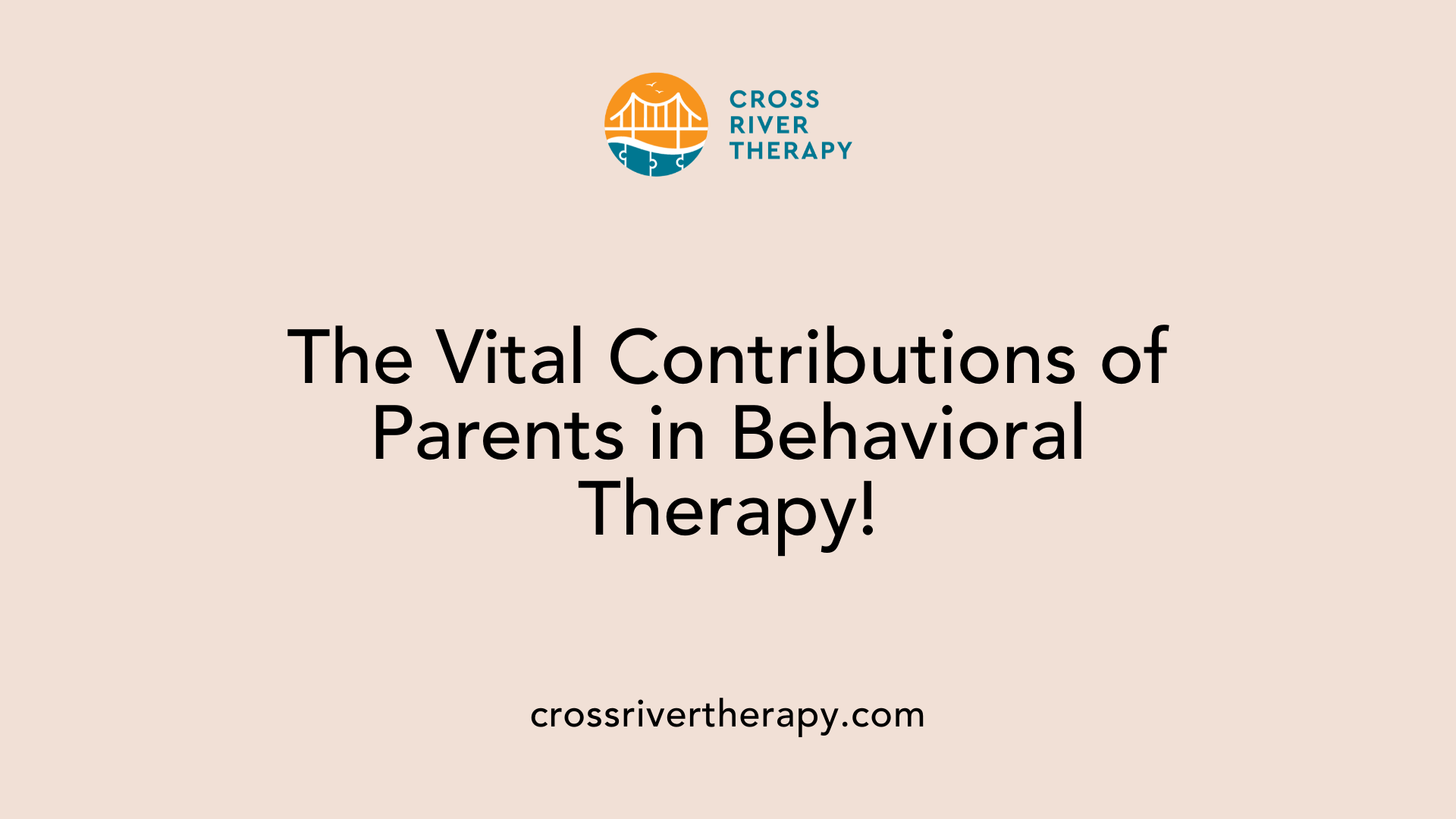The Role of Parent Feedback in Enhancing ABA Therapy
Unlocking the Potential of ABA Therapy Through Parent Involvement
Introduction
Parent feedback plays a critical role in enhancing Applied Behavior Analysis (ABA) therapy, especially in fostering the development of children with autism spectrum disorder and other disabilities. This article will delve into the profound impact of parental involvement in ABA therapy, examining strategies for successful collaboration, and offering practical insights into how parents can stay engaged in their child's therapeutic journey.
Understanding Parent Training in ABA Therapy

What is parent training in ABA therapy?
Parent training in ABA therapy is a systematic approach that equips parents with the necessary strategies to apply techniques used in clinical settings in their own homes and communities. This training is vital for sustaining therapeutic advances and ensuring that behavioral improvements are integrated into everyday life.
Parents become adept at recognizing and managing their children's challenging behaviors. They learn to employ positive reinforcement to encourage appropriate actions and identify replacement behaviors for concerning behaviors.
Purpose and importance of parent training
The primary aim of parent training is to ensure continuity between therapy sessions and home life. Effective parent involvement can significantly enhance a child’s skill acquisition and emotional well-being. This consistent application of strategies reinforces learned behaviors, making them integral to a child's daily routine.
Techniques covered in training
Common techniques addressed during parent training might include:
- A-B-C Strategy: Understanding Antecedents, Behaviors, and Consequences to modify behavior.
- Discrete Trial Training: Breaking skills into small, teachable components.
- Picture Exchange Communication System (PECS): Aiding communication for non-verbal children.
Empowerment through role-playing and communication
Role-playing and open communication with therapists empower parents, allowing them to practice newly acquired techniques in a safe environment. By simulating various scenarios, parents gain confidence to implement strategies effectively in real-life contexts, fostering a collaborative relationship that supports their child's growth.
Active participation in this manner not only strengthens the child’s progress but also deepens the emotional bond between parent and child.
The Integral Role of Parents in ABA Therapy

What is the role of parents in ABA therapy?
Parents play a crucial role in the success of ABA therapy, especially for children with autism spectrum disorder (ASD). They not only reinforce the skills learned during therapy but also help children apply them across various settings, including at home and in the community. This consistency is key for effective behavior modification and generalization of learned skills.
Reinforcement of skills
Parents are positioned to provide immediate feedback and opportunities for practice that support their child's ongoing development. They can assist in reinforcing language skills, such as encouraging polite interactions, or supporting independence through chores. By integrating ABA strategies into daily routines, parents ensure skills are consistently reinforced, leading to better progress.
Participation in training sessions
Active involvement in training sessions with Board Certified Behavior Analysts (BCBAs) is another vital component of parent engagement. These sessions equip parents with essential strategies to manage challenging behaviors and promote their child's development. The knowledge gained allows parents to effectively practice techniques at home, enhancing their ability to support their child’s needs.
Emotional and practical support
In addition to practical involvement, parents provide essential emotional support, which is fundamental in maintaining a child's motivation and engagement in therapy. Their consistent presence during sessions fosters a collaborative atmosphere, strengthening the bond between parent, child, and therapist. This active participation culminates in not only improved skills but also a deeper emotional connection, further enriching the therapy experience.
| Role of Parents in ABA Therapy | Importance | Impact on Child |
|---|---|---|
| Reinforcing skills | Maintains consistency | Better behavior modification |
| Participating in training sessions | Empowers with strategies | Enhanced technique application |
| Providing emotional support | Increases motivation | Improved engagement in therapy |
Parent Coaching: A Key Component of ABA Therapy

What is parent coaching in ABA therapy?
Parent coaching in ABA therapy is an essential component that actively involves parents in their child's treatment for behavioral challenges, particularly those associated with autism spectrum disorder (ASD). This approach empowers parents with evidence-based strategies to manage difficult behaviors, enhance communication, and promote social skills.
Through tailored parent training sessions, parents collaborate with a Board Certified Behavior Analyst (BCBA) to create a treatment plan aligned with their child's specific needs. This collaboration ensures that skills learned in therapy are not only applied during sessions but also generalized and maintained in the home environment.
The Importance of Collaboration with BCBAs
Open communication with the BCBA is vital for reinforcing positive behaviors and achieving consistent progress. By regularly participating in training sessions, parents gain insights into their child's unique preferences and triggers, helping to shape personalized intervention plans. This direct involvement also enables parents to provide immediate feedback to therapists, further enhancing their child's development.
Improving Family Life
Implementing strategies learned during parent coaching fosters a stronger emotional bond between parents and children. Active participation in the therapeutic process cultivates a collaborative atmosphere, resulting in improved family dynamics. By practicing skills in everyday situations, parents facilitate the generalization of learned behaviors, making a significant impact on their child's life skills and overall development.
The Impact of Parental Involvement in ABA Therapy Effectiveness
Importance of consistency
Parental involvement is essential for the effectiveness of ABA therapy, particularly due to the consistency it provides across different environments. When parents actively engage in their child's therapy, they reinforce learned behaviors consistently at home. This alignment between therapy sessions and everyday routines helps solidify skills, ensuring that children can apply what they learn in various contexts.
Positive reinforcement
Parents serve as primary agents of positive reinforcement. By leveraging praise and rewards, they motivate their children, making the learning process enjoyable and encouraging desired behaviors. This immediate feedback from parents significantly boosts a child's engagement and commitment to the therapeutic process, further enhancing skill acquisition.
Generalization of skills
Active parental involvement not only strengthens the learning environment but also facilitates the generalization of skills taught during therapy. When parents implement and encourage techniques learned, such as communication or social skills in their daily lives, they provide their children with opportunities to practice in real-life situations. Research indicates that children with involved and supportive parents often demonstrate more substantial progress, reinforcing the crucial role of parents in shaping the success of ABA interventions.
| Aspect | Description | Impact |
|---|---|---|
| Consistency | Ensured reinforcement of learned behaviors in different settings. | Improves behavior modification effectiveness. |
| Positive Reinforcement | Encouragement through praise and rewards from parents. | Enhances motivation and learning engagement. |
| Skill Generalization | Opportunities for practice provided in real-life situations by parents. | Leads to improved application of skills. |
Strategies for Parents to Enhance Therapy Outcomes

What are some strategies for parents to enhance ABA therapy outcomes through their participation?
Parents can enhance ABA therapy outcomes through several strategic approaches. Here are some effective ways to get involved:
Active Participation: Attend therapy sessions whenever possible. This allows parents to observe techniques and strategies used by therapists, fostering consistency across home and therapy settings. Parents' involvement strengthens their relationship with both the therapist and the child, essential for effective learning.
Consistent Feedback: Keeping an open line of communication with therapists enables parents to provide valuable insights about their child's behavior and progress. This feedback is crucial for tweaking therapeutic approaches and ensuring they cater to the child’s evolving needs.
Implementing Techniques at Home: Regular practice of ABA techniques in daily routines reinforces learning. Parents can create structured environments that consistently apply positive reinforcement, helping translate skills learned in therapy to real-life situations, such as encouraging polite language or completing household chores independently.
Creating Structured Environments
Establishing a structured and predictable home environment greatly benefits children undergoing ABA therapy. Consider the following:
- Routine Development: Design daily routines that include established times for learning and play, making transitions smoother for the child.
- Visual Supports: Utilize charts or schedules to visually outline tasks and expected behaviors, providing clear expectations and reducing anxiety.
Training and Implementation of ABA Techniques
Parent training sessions offered by ABA programs are essential for empowering caregivers. Some advantages include:
- Skill Acquisition: Parents learn the fundamentals of ABA principles, allowing them to successfully reinforce behaviors at home.
- Practical Tools: Training provides parents with effective strategies to handle challenges and promote their child’s growth, helping to maintain their motivation and engagement.
Active parental involvement, combined with effective training and structured support, enhances the overall efficacy of ABA therapy, leading to positive outcomes for children.
Effective Communication Between Parents and ABA Therapists
Importance of Transparent Communication
Effective communication between parents and ABA therapists is foundational for successful therapy outcomes. By sharing insights regarding a child's progress, parents can pinpoint areas needing attention while therapists can update parents on strategies deployed during sessions. This continuous feedback loop enhances understanding, ensuring that both parties remain engaged in the child’s therapy journey.
Shared Goal Plans
Collaboration in setting clear, measurable goals fosters a unified approach to therapy. When parents and therapists work together to articulate specific objectives, it strengthens the therapeutic process. These collaborative goal plans not only motivate both parents and children but also streamline progress tracking, allowing for timely adjustments in strategies based on ongoing feedback.
Timely Information Exchange
Establishing a regular communication schedule is vital for synchronizing efforts between home and therapy sessions. Scheduled check-ins enable timely updates on developments and challenges, ensuring that therapy practices are consistently reinforced in various settings. This proactive approach keeps everyone informed, ultimately enhancing the effectiveness of ABA interventions.
Monitoring ABA Therapy Progress Through Parent Engagement
How can parents stay engaged with ABA therapy and monitor progress?
Parents play a pivotal role in the success of Applied Behavior Analysis (ABA) therapy, particularly in monitoring their child's progress. Active involvement begins during therapy sessions where parents can observe, ask questions, and learn about the techniques employed by therapists. This understanding empowers them to apply these strategies consistently at home, ensuring that the therapy principles are reinforced outside of sessions.
Regular communication with therapists is crucial. Parents should share their observations about their child's behavior at home and any changes they notice. This feedback can lead to necessary adjustments in the treatment plan that better meet their child's unique needs. Maintaining a communication schedule fosters collaboration between parents and therapists, promoting an effective support system.
Moreover, parents are encouraged to review progress data regularly. This not only helps them track their child’s development but also enables them to celebrate small milestones—reinforcing positive behaviors and encouraging further skill generalization.
Observing and Sharing Feedback
By observing their child's interactions, parents can provide immediate feedback and create opportunities for practice that support skill acquisition. They have intimate knowledge of their child's preferences and challenges, which can be invaluable in crafting personalized intervention plans.
Celebrating Milestones
Celebrating achievements, no matter how small, helps maintain motivation for both the child and the parent. Parent training sessions offered by ABA programs equip parents with the tools necessary to support their child's development consistently, ultimately enhancing the overall efficacy of the therapy.
Prioritizing self-care is also essential for parents, as it allows them to remain engaged and effectively support their child’s journey through ABA therapy.
The Significance of Parent Participation in Achieving Therapeutic Goals

Setting Measurable Goals
Collaboration between parents and therapists is essential for setting clear, measurable goals in ABA therapy. When parents participate in this process, they can track their child's progress more effectively, celebrating every achievement, no matter how small. This obtainable goal-setting empowers parents to see firsthand how their involvement directly influences their child's development.
Consistent Implementation
Parents are crucial in ensuring that ABA strategies are consistently applied across different environments. This consistency helps reinforce the skills learned during therapy sessions, allowing children to practice in real-life situations. By integrating these strategies into everyday routines, parents create a supportive atmosphere that enhances the effectiveness of the therapy.
Positive Outcomes Beyond Therapy
The benefits of active parental involvement extend beyond skill acquisition. Research shows that it leads to improved bonds between parent and child and better overall emotional support, which is vital for maintaining a child's motivation in therapy. Moreover, as parents become more engaged, they can provide immediate feedback, helping therapists tailor interventions to suit their child's unique needs. This collaborative approach not only ensures improved outcomes during therapy but also fosters long-lasting results that impact the child's development in daily life.
| Area of Focus | Role of Parents | Impact on Child's Development |
|---|---|---|
| Setting measurable goals | Collaborating to define objectives | Tracking progress and celebrating achievements |
| Consistent implementation | Reinforcing skills across home and community | Supporting skill generalization in real-life contexts |
| Positive outcomes beyond therapy | Enhancing emotional support and motivation | Fostering long-lasting behavioral improvements |
Building a Supportive ABA Therapy Environment at Home
Application of ABA strategies at home
Parents are in a unique position to implement and reinforce applied behavior analysis (ABA) strategies throughout their child's daily routines. They possess intimate knowledge of their child's preferences, strengths, and triggers, which helps in tailoring effective interventions. Observing sessions allows parents to practice techniques learned during therapy, ensuring consistency across settings.
Reinforcement of skills in daily routines
Reinforcing skills learned during therapy is essential for behavior modification. By integrating ABA strategies into everyday activities, such as encouraging polite language or managing chores, parents can provide a practical context for skill application. This consistency fosters a supportive atmosphere conducive to learning and behavior change.
Creating opportunities for practice
Parents play a critical role in generalizing skills by creating opportunities for practice in various real-life scenarios. For example, they can set up social situations where their child can use newly acquired communication skills or problem-solving techniques. Such practices not only solidify learning but also show children that their progress is valued, enhancing their motivation and engagement in the therapy process.
Conclusion
Parental involvement in ABA therapy is indispensable, offering numerous benefits that significantly enhance the therapeutic outcomes for children with disabilities. As parents engage in training, communicate openly with therapists, and implement learned strategies at home, they not only facilitate the generalization of skills but also contribute to their child's overall development. Parent feedback not only supports the child's progress but also builds a nurturing environment that aids in long-lasting success, underscoring the collaborative nature of effective ABA interventions.
References
- Tips Effective Parent-Teacher Communication During ABA Therapy
- Helping Parents Understand Applied Behavior Analysis: Creating a ...
- The Role of Parent Involvement in ABA Therapy
- Why Parent Involvement is Key to Effective ABA Therapy
- The Importance of Parent Involvement in ABA Therapy
- The Role of Family in ABA Therapy: Tips for Parents
- Stay or Go? Understanding the Role of Parents in ABA Therapy
- Why Parent Training in ABA is Critical to Success



